Vassar and the Community: Learning on a Two-way Street
In Poughkeepsie, the learning goes both ways — by helping provide area youth with a leg-up on education, Vassar provides rich experiential learning opportunities for its own students.
According to Peter Leonard, director of Vassar’s Field Work Program, 75 percent of Vassar students have had some field work or community work-study experience by the time they graduate, and his office places 200–300 students each semester. Leonard contends that Poughkeepsie’s size—in contrast to a megacity like New York—makes it an ideal environment for experiential learning. “It puts students in touch with people who make decisions,” he notes. As examples, Leonard points to two recent field work students who have participated in HIV policy discussions at the city’s Department of Health and planning for the Walkway Over the Hudson, the country’s largest pedestrian bridge, at the city’s Planning Division.

(l-r) Educational Outreach Coordinator Leslie Williams; Professor Brian Godfrey takes VC students on a tour of
Poughkeepsie; Williams leads a tour of campus for Circle of Courage Learning Center students.
Many of Vassar’s field work, internships, and community work-study positions are focused on increasing educational opportunities for Hudson Valley youth—from helping translate lessons for English as a second language students to introducing elementary school children to hands-on science at the Vassar Farm. One such program is Vassar Science Scholars, created in 1996 by Professor of Mathematics Charlie Steinhorn. It is aimed at increasing mathematic and scientific literacy of local high school students by exposing them on a regular basis to real-life examples of scientific research and mathematic problem solving. To this end, Steinhorn recruits Vassar math and science faculty to guide the students eight times a year in workshops on everything from artificial intelligence to the behavior of nematode worms.
During their sophomore year at Poughkeepsie High School (PHS) Edgar Rivera-Cash and his twin brother, Dennis, both members of the Vassar Class of 2013, were recommended for Science Scholars by a teacher who recognized their growing interest in and aptitude for science. EdgarRivera-Cash was impressed by the way the professors conducted the lectures and hands on labs, presenting their own research rather than a mandated curriculum. The brothers liked the program so much they participated in it until they graduated and say the experience reinforced their desire to apply to the college (as did Vassar’s recent promise to replace loans with scholarships for PHS students who are admitted). The Rivera-Cash brothers became two of four PHS students to have earned the Poughkeepsie High Scholarship since 2006.
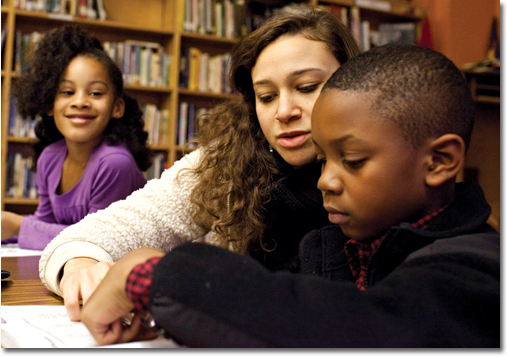
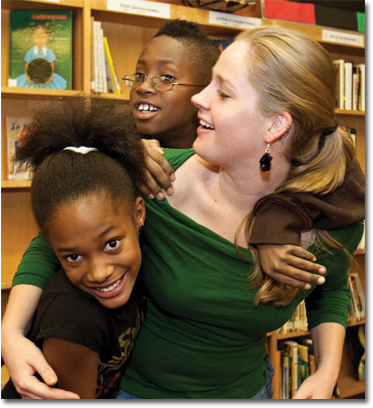
(l-r) Seniors Rachel Gilmer and Hensleigh Crowelvolunteer at REAL START afterschool program in downtown Poughkeepsie
Vassar Science Scholars has also been a rewarding opportunity for the Vassar student interns who help run the program. Pat Gordon ’06 served as an intern during her senior year and learned a lot about teaching as a result. “When kids see science and math as subjects they need to learn in order to pass tenth grade, they may not care about them. When they see them as subjects that people are actively investigating, with results that impact their lives, they become interested,” she says. Science that touched on recent world events also captivated the students, Gordon notes, recalling one demonstration by Associate Professor of Earth Science Brian McAdoo that explained the mechanics involved in the devastating 2004 Indian Ocean tsunami. “I was learning as much as the kids,” she admits.
This front-row seat suited Gordon, who had long been enchanted with science. In middle school, she had been determined to study whales and dolphins, creatures with which she was “fairly obsessed” before discovering chemistry and molecular biology in a high school advanced placement class. Craving even more involvement with science, she asked for and received special permission to split her time between her high school and a research lab at the University of Minnesota, where she studied signal transduction pathways in plants.
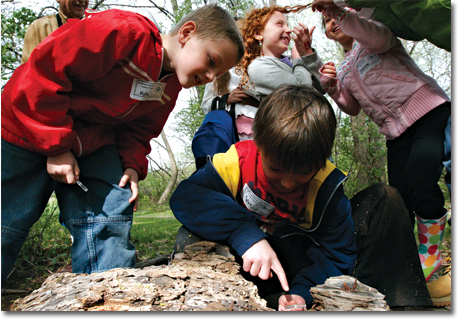
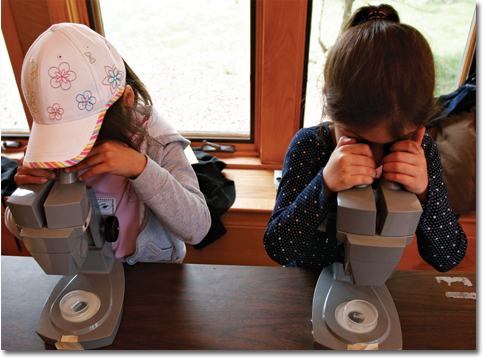
Elementary school students explore science at the Vassar Farm.
After graduating from Vassar, Gordon carried her lessons in science and teaching to the Peace Corps, where she worked as a biology and chemistry teacher in a rural high school in Ghana, an experience that further strengthened her desire to teach. She sees herself teaching at a small liberal arts college, where she will be able to closely interact with students and also do scientific research.
Gordon is now a Ph.D. candidate in biochemistry and molecular biophysics at Columbia University. She recently received a prestigious National Science Foundation Graduate Fellowship, which encourages fellows to “become life-long leaders that contribute significantly to both scientific innovation and teaching,” and says that Science Scholars definitely boosted her application.
Because of such clear benefits, Dean of the College and former chair of the Education Department Chris Roellke is careful not to characterize the efforts of students such as Gordon as simply community service. “We as a college benefit just asmuch as our partners,” he says. “These are profound learning experiences for our students.”
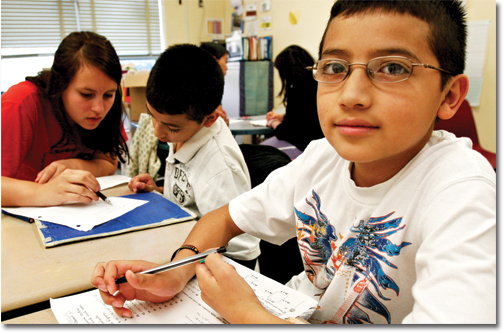
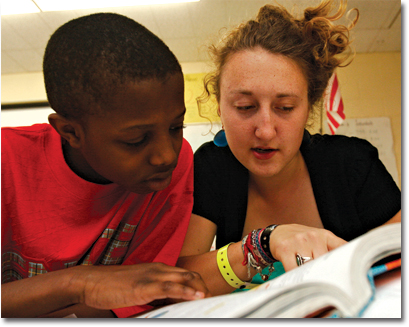
Students at Poughkeepsie Middle School get help from VAST tutors.
Edgar Glascott, principal at Poughkeepsie Middle School (PMS), where Vassar education majors work in the classroom doing observations, field work, and student teaching, has seen firsthand how advantageous these educational partnerships are for all involved. “Our kids get help with academic and social skills andmake friends with students who are older and with whom they’re able to talk,” he says. “Vassar students not only meet their school requirements, but also have experiences in the classroom that help them gauge whether this is a field they’d like to go into.”
Building the Educational Infrastructure
When Chris Roellke came to Vassar’s Education Department in 1998, he was pleased to see that so many students were interested in gaining experiences in urban contexts, but after becoming department chair, he realized that a lack of proper coordination in these areas was leaving local schools “overwhelmed with good intentions.”
Conversations with the Arthur Vining Davis Foundations led to a 2003 grant to start Vassar’s Urban Education Initiative with the goal of tracking alumnae/i working in urban schools, expanding field work opportunities for students interested in working in urban education, and connecting Vassar arts and sciences professors with local schools for learning collaborations.
In 2009 the Dyson Foundation awarded Vassar $600,000 to expand the Urban Education Initiative. The grant allowed Vassar to hire an educational outreach coordinator, Leslie Williams, to deal with what Roellke calls “the increasing bandwidth of interest” for educational partnerships. The position is a conduit through which faculty members can engage schools in their coursework and through which teachers from local schools and community-based, youth-serving organizations can approach Vassar.
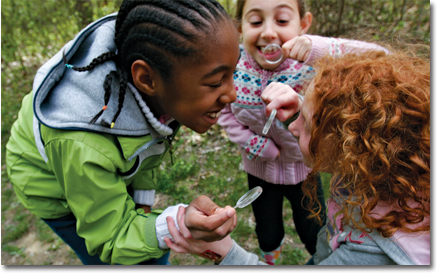
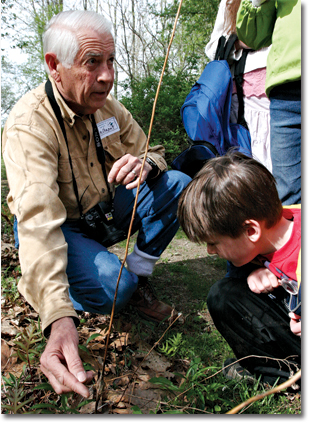
Fun and learning at the Vassar Farm
Williams, a former Poughkeepsie elementary school teacher and educational consultant, has spent the last few years focused on raising the sights of public school children, parents, and urban school districts. A true advocate of relationship building, Williams is using networking strategies to fortify what he calls the “Matrix of Excellence,” a group of allies dedicated to improving academic and social outcomes for Poughkeepsie’s middle - and high - school students. Since coming on board, Williams has spent more than 700 hours in the city’s schools, getting to know teachers and administrators. He has also involved parents, making scores of home visits and phone calls and hosting Parental Shared Leadership meetings.
Thanks to the Dyson grant, Vassar was able to initiate the Exploring College program, a three-year pilot project intended to boost college readiness and aspirations among high-achieving, low-income students at Poughkeepsie High School. Starting this spring, Exploring College will pair selected Poughkeepsie High students, beginning in ninth and tenth grades, with two mentors—a Vassar student and faculty member or administrator—who will help them craft effective college applications and teach them how to survive and thrive in college once they have been admitted. Over the summer, rising juniors will attend a two-week residential college prep program modeled after Vassar’s award-winning Exploring Transfer program, which for 25 years has helped community college students expand their vision to include four-year college.
As a result of these intiatives and ongoing efforts such as the highly regarded Vassar After-School Tutoring (VAST) program, enthusiasm for such Vassar-Poughkeepsie educational partnerships is growing. Chris Roellke is pleased that Vassar is making progress in building bridges, but he knows there is much left to do. “Are we going to have every Poughkeepsie High School student at the end of this three-year grant going to a four year college?” he asks. “Perhaps not. But are we going to develop a whole new level of respect between the local community and Vassar? I think the answer is ‘Yes.’”
—Elizabeth Randolph
For more on those helping to strengthen the relationship between Vassar and the local community, visit Portraits in Community Engagement.
Photo Credits: Vassar Farm, Johanna DeKrey-Hotaling; VAST, Johanna DeKrey-Hotaling; REAL START, Evan Abramson; Leslie Williams, John Rizzo and Gabe Schuster; Brian Godfrey, Evan Abramson
Have comments about this article? Email vq@vassar.edu
